America’s forty year War on Drugs has played a huge role in the unforgiving destruction of black and brown families who reside in low-income neighborhoods. In 1971, President Richard Nixon stated, “America’s public enemy number one in the United States is drug abuse. In order to fight and defeat this enemy, it is necessary to wage a new, all-out offensive.” Although the intent of the War on Drugs was to criminalize all drugs, the way in which the war was operationalized, was the most damaging part. The ongoing effects of the War on Drugs can be measured in many different ways; whether it’s the billions of dollars wasted each year in the United States to enforce useless marijuana laws, or an individual wasting years behind bars for a non-violent marijuana arrest, or the lives severely damaged by the harsh after effects that stem from the most minor marijuana offenses.
To further put this into perspective, in October 2010, Bernard Noble was stopped on the street by the police while riding his bike. Noble, who was riding in an area of New Orleans that is heavily populated by African Americans, was searched. Police found 2.8 grams of marijuana or the equivalent of two “joints”. Because he had prior non-violent drug offenses — for small amounts of cocaine and marijuana — an Orleans Parish jury convicted him under a state law that gives harsher punishments for habitual offenders and sentenced him to more than 13 years in prison. Another man by the name of Jeff Mizanskey was sentenced to life without parole for participating in the purchase of a five pound brick of marijuana and having two prior non-violent convictions.
Sadly, ridiculously long and unfair sentences only scratch the surface of the problems that the War on Drugs creates. There are hundreds of thousands of people each year that get arrested for marijuana but do not go jail. These individuals, however, will have that arrest on their record for years which can jeopardize numerous things such as getting a job, loan or even a house.
What is more troubling about the War on Drugs is the racial disparity. Whites and blacks use marijuana at roughly the same rate; however, blacks on average are 3.7 times more likely than whites to be arrested for possession, according to a study by the ACLU. The disparity can get even more severe depending on where you live in America. In some of the worst-offending counties in the country, blacks are 30 times more likely to be arrested. Blacks are also 10 times as likely as whites to go to prison for drug offenses. The War on Drugs has effectively created an onslaught on the black community especially if they live in a low income neighborhood.
Possibly the worst part about the War on Drugs is that it is ineffective. After four decades of criminalizing marijuana, the general usage has not gone down. The United States ranks third among cannabis consuming countries by percentage of users based on population with nearly 15%. That equals about 50 million Americans which is more than the total population of some countries on the same list. Furthermore, law enforcement agencies complain about how they need more money when they spend millions enforcing non-violent marijuana laws and arresting citizens. The money can be better used to combat violent crimes, gangs, provide health services for the addicted; or to investigate, indict and prosecute major drug traffickers.
Looking at this through a state’s point of view, California spends over $150 million dollars each year to enforce marijuana laws. California also has an estimated $15 billion dollars in illegal marijuana transactions each year. If we tax and regulate marijuana like alcohol and cigarettes, which are both significantly more harmful than marijuana according to a study conducted by the Nature Publishing Group, California will generate billions of dollars of annual revenue for the state to fund jobs, health care, schools, libraries, roads and most importantly, rebuilding our communities that the War on Drugs has destroyed. Establishing legal and regulated sales outlets would put dangerous street dealers and drug lords out of business which would contribute to urban community core revitalization by creating jobs and helping money circulate within African American neighborhoods.
The complete legality of marijuana is imminent. It is only fair that African Americans as well as people of color have an opportunity to benefit from something that has done so much harm to our communities. Michelle Alexander, author of “The New Jim Crow”, highlighted a disturbing contradiction regarding marijuana legalization in America. She stated, “40 years of impoverished black kids getting prison time for selling weed, and their families and future destroyed. Now, white men are planning to get rich doing precisely the same thing.”
Although all African Americans may not want to play a role in the commercialization of marijuana, it is extremely important that we realize the injustice America would be doing by not allocating a sufficient amount of resources to the African American community when the billions of dollars flood in from marijuana legalization. It is also critically important for African Americans to demand licenses and equal entrepreneurial opportunities that stem from the commercialization of marijuana so that we can put an end to the War on Drugs and the War on our community.
Alice A. Huffman
President, CA-NAACP
1215 K Street, Suite 1609
Sacramento, CA 95814
916.498.1898
For more information regarding this article, please contact our Legislative Advocate, Edwin Perez at 916.498.1898 or by email – edwinperez@ca-naacp.org.




